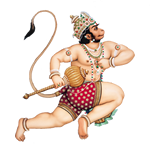Like many Sanskrit words in the Yoga lexicon, the word guru has both a literal and symbolic meaning. Literally it means "heavy, weighty; heavy in the stomach (as food), difficult to digest; excessive, difficult, hard; important, serious, momentous; valuable, highly prized; venerable, respectable." The guru is the venerable "weighty one," heavy with wisdom, that's both highly prized but at times difficult to digest, often because teaching seems to contradict everything we hold true, or because we're told things about ourselves we don't especially want to hear. The yogis also assign imaginative etymologies to their words to bring out something essential about what they name; typically the word is split into its constituent syllables, in this case "gu" and "ru," which are then given symbolic (but not literal) definitions, here "darkness" and "light" respectively. In this sense then, the guru is the one who leads us from the "darkness" of self-ignorance to the "light" of self-understanding.
In the old days, a guru was an indispensable element of yoga practice; in fact, without a guru there was no practice, he (or sometimes she) being the only source of information and, more importantly, grace. Unless you could win the acceptance and trust of a guru, you were as we say nowadays "out of luck." This is something that's difficult for us to understand now that yoga has become a mass movement, readily and cheaply available through public classes and workshops, books, CDs, DVDs, and so on. We tend to take our yoga instruction for granted since it can be had with so little effort, but once upon a time it was "serious, momentous, important." But it wasn't just words the guru brought to the table, he also was a source and conductor of transformative energy, without which liberation, according to many, isn't possible.
Not everyone though agrees a guru is a necessity. The late Indian teacher Jiddu Krishnamurti, for example, maintained that the guru was nothing more than an escape mechanism, another way of avoiding the truth about yourself. "You are a human being," he said, "with sorrow, pain, suffering, joy, and when you deny yourself and give yourself over to somebody, you are denying reality because it is only through yourself that you can find reality, not through somebody else." This may indeed be true for many seekers, but is it so for all? Ironically, though he would deny it vehemently, Krishnamurti was himself a guru, a magnet for countless souls looking for "reality."
All of this has been occasioned by a fascinating story one of my students told me about an experience she had on a trout fishing trip to South America. She decided to go off by herself, and spent the day unsuccessfully trying to land the "big one." That evening at her lodge, she spoke with one of the guides hired by the other fishers, who told her that she had actually spent her day in a swamp, that the river with all the fish was some distance away, and that without the proper equipment to wade in the river, she wouldn't have been able to fish anyway even had she been at the river.
Do we need a "guide" in yoga? Many years ago, before I was a teacher, a young man showed up in my yoga class one day who did amazing asanas. After class, when I complemented him on his postures, he told me that the class just finished was one of the first formal classes he'd ever taken. I was blown away, to say the least, and asked him his secret. It turned out he'd been following the course outlines at the back of Light on Yoga for a few years on his own, mimicking the pictures of Iyengar. It seems he had a natural capacity for beautiful poses, but knew practically nothing about yoga.
It seems to me that the teacher is similar to the proverbial boat we hear so much about in teaching stories. If you need to cross a river, especially one that's deep with a strong current, a boat is very useful, as are oars and the right rowing technique to keep from being swept downstream. A teacher is all this: she's the "boat" and "oars" and provides you with the knowledge to row steadily to the far shore, compensating for the push of the "currents" around you. Once the far shore is reached, then we might take Krishnamurti's advice and leave the boat and oars behind.
